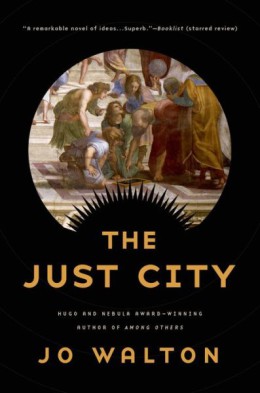Let’s talk about “Strong female characters.” And “agency.”
It’s been a few months since Kate Elliott’s post here at Tor.com about Writing Women Characters As Human Beings. It’s probably been a while since I’ve touched on the topic myself, even in passing. But recently a conversation on Twitter and a certain amount of time pondering the opening chapters of Jo Walton’s The Just City has got me pondering how we talk about strength in fictional narratives, especially as it relates to femaleness, but also in terms of a more diverse array of historically overlooked people.
What’s the relevance of Walton’s The Just City? In its opening chapter, the god Apollo discovers that he doesn’t understand quite as much as he thought he did. He has not entirely grasped why a nymph would rather become a tree than have sex with him. It’s about volition and equal significance, and this becomes one of the themes not just of The Just City but its sequel as well.
And I’m starting to think that volition and equal significance are better ways to think about, and to talk about, women’s narratives and storylines and presences in fiction. Not just women’s, mind, but very often when we talk about agency and strength we are talking about women.
I once had a memorable conversation in which a gentleman—you might recognise his name, so I will withhold it, as this is only an example of a prevailing point of view—shared his view that there was only one kind of heroism, really, and that was going out and doing active heroic deeds that involved risking one’s life in violence or in something like firefighting. It seemed to me to be a very manly, muscular view of heroism, one that elided almost entirely the kind of courage and—in my view—heroism possessed by people who risk either their freedom or their lives daily, often far more quietly, in political activism under repressive systems of governance, or in ongoing advocacy for (for example) women’s rights in close proximity to people who are violently hostile to their ideas.
Some people choose activism and advocacy already knowing the risks they might run. Other people slide into it by degrees, or find themselves propelled into it by circumstance.
Some people never go out and Do Deeds of any active kind. Their heroism—if we may see it as heroism in a narrative sense—is surviving under strain, mental or emotional or physical or all three. Sometimes intolerable strain. Survival is a quiet ongoing necessity, and living under circumstances that one can neither abandon or substantially change has historically been the lot of many women. Because their struggles were domestic—because their choices were, and often still are, significantly more constrained than the men around them—they are overlooked as heroes.
The difference between choice and circumstance is the difference between having and lacking obvious agency, because the way we talk about the interrelationship of agency and narrative is all about choice, and exercising it. Just as the difference between kinds of heroism can be seen as a divide between something which is masculine and active—if we think about violent heroism, one can see it almost as penetrative—and something which is feminine, passive, and elastic. Between strength and not-strength.
I’m not saying that these things are masculine and feminine, strong and not-strong. I’m saying they can be seen—that we are culturally conditioned to see them—in that light. In discussing female characters in terms of agency and strength we sometimes forget that there are constraints on choice, and that there is more than one way to be strong.
But if instead of agency and strength we turn to volition and equal significance we open up the field of view. Is the female character represented as having a will of her own? Does the narrative respect her volition? Does it represent her as possessing an equal significance with everyone around her, even if people around her don’t see her as equally significant? Does it, in short, represent her as fully human? Fully human, and not a caricature or a type?
(I know. It’s a low bar to leap. Astonishing how often someone falls to hurdle it—and not just with bit-part characters.)
I’m still thinking about how much easier borrowing volition and equal significance has made articulating some problems to myself (and not just in narrative, although that’s what I’m talking about here) that strength and agency don’t seem to define.
What do you all think about all this, anyway?
Liz Bourke is a cranky person who reads books. Her blog. Her Twitter.










